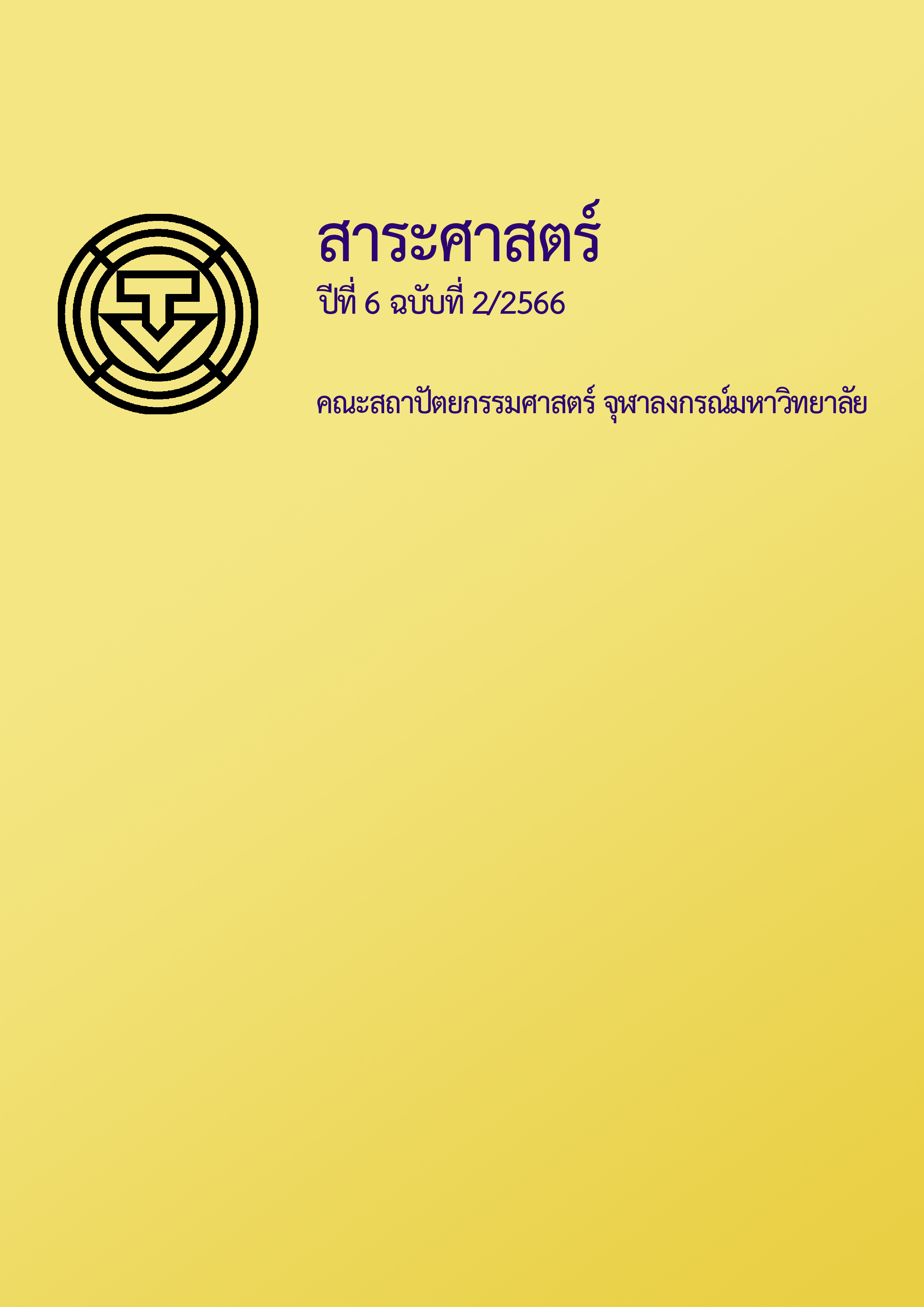Conceptual Framework of Tourism Resilience in Spatial Planning Organization in Thailand Context
Main Article Content
Abstract
Building resilience in the tourism industry is a goal of urban development and urban economic revitalization that many international organizations and countries are prioritizing after being severely affected by COVID-19 which severely damaged the economy and the tourism sector, especially in countries that rely mainly on tourism like Thailand. The objectives of this article are as follows: to review and synthesize literature and research related to tourism resilience, especially on spatial management and related organizations or spatial planning organization; to create an organizational framework for spatial development strategies and tourism city development strategies that are more flexible in dealing with crises appropriate to the context of Thailand; and to help pave the way for further studies, research, and development of policies and strategies for spatial development that promote the country’s tourism sector recovery, encourage sustainable development, building its resilience to future crises.
Article Details
References
กรมการท่องเที่ยว. (2563). แนวทางการบริหารจัดการแหล่งท่องเที่ยว. https://www.dot.go.th/storage/ebooks/January2019/AlzAxoKlnGGUUEh9JE36.pdf
กาญจนา จันทรชิต, พิมพ์พาภรณ์ สุทธหลวง, ธัญลักษณ์ โกษาเวียง, และศุภชัย ธรรมสุปรีดิ์. (2565, สิงหาคม 22). การท่องเที่ยวไทยฟื้นตัวแล้วหรือยัง? วารสารการเงินการคลัง, 34(110). http://www.fpojournal.com/thai-tourism-situation/
การท่องเที่ยวแห่งประเทศไทย. (2561). โครงการศึกษาพฤติกรรมนักท่องเที่ยวชาวไทยที่มีศักยภาพในการใช้จ่าย: รายงานฉบับสมบูรณ์. ททท.
นรพัชร์ อัศววัลลภ, พิมพ์พาภรณ์ สุทธหลวง, และสุดาพันธุ์ สำลี. (2564, 30 พฤศจิกายน). การท่องเที่ยวในลักษณะคลัสเตอร์กลุ่มจังหวัดกับแนวทางเพิ่มโอกาสในการกระจายรายได้. วารสารการเงินการคลัง, 33(107). http://www.fpojournal.com/thai-tourism-cluster/
ศูนย์วิเคราะห์เศรษฐกิจ ทีทีบี. (2565). ttb analytics มองไทยเที่ยวไทยยอดพุ่งครึ่งปีหลัง คาดทั้งปีโต 161.7%. https://www.ttbbank.com/th/newsroom/detail/halfyear-travel-2565
สยามรัฐออนไลน์. (2563). โควิด-19 ส่งผลกระทบต่อภาคอุตสาหกรรมท่องเที่ยวไทยเป็นอันดับหนึ่งของโลก. https://siamrath.co.th/n/146002
สุรีย์ บุญญานุพงศ์, กรวรรณ สังขกร, สามารถ สุวรรณรัตน์, ใจรัตน์ จตุรภัทรพร, และไพรัช พิบูลรุ่งโรจน์. (2559, มกราคม). แผนงานการบริหารจัดการและการพัฒนาการท่องเที่ยวเชิงวัฒนธรรม เส้นทางอารยธรรมล้านนาเชื่อมโยงกับ สปป.ลาว สหภาพเมียนม่าร์และสาธารณรัฐประชาชนจีน(ตอนใต้) : รายงานฉบับสมบูรณ์. http://tourismlibrary.tat.or.th/medias/RDG5750050V01_full.pdf
Brouder, P., Teoh, S., Salazar, N. B., Mostafanezhad, M., Pung, J. M., Lapointe, D., Higgins Desbiolles, F., Haywood, M., Hall, C. M., &
Clausen, H. B. (2020). Reflections and discussions: Tourism matters in the new normal post COVID-19. Tourism Geographies, 22(3), 735-746. https://doi.org/10.1080/14616688.2020.1770325
Farag, N., Eldayem, G. A., & Elfatah, A. A. (2023). Smart resilience city as an approach to improve disaster risk reduction. Journal of Urban Research, 47(1), 120–139. https://doi.org/10.21608/jur.2023.157191.1106
Hall, C. M., Prayag, G., & Amore, A. (2017). Tourism and resilience: Individual, organisational and destination perspectives. https://doi.org/10.21832/HALL6300
Holling, C. S. (1973). Resilience and stability of ecological systems. Annual Review of Ecology and Systematics, 4(1), 1-23. https://doi.org/10.1146/annurev.es.04.110173.000245
Hu, H., & Xu, K. (2022, September 30). Visualizing the development of research on tourism resilience with mixed methods. SAGE Open, 12(3). https://doi.org/10.1177/21582440221126684
Koren, D., Kilar, V., & Rus, K. (2017, October). Proposal for holistic assessment of urban system resilience to natural disasters. IOP Conference Series Materials Science and Engineering, 245(6), 062011. https://doi.org/10.1088/1757-899X/245/6/062011
Miao, L., Im, J., Fu, X., Kim, H., & Zhang, Y. E. (2021). Proximal and distal post-COVID travel behavior. Annals of Tourism Research, 88(9), 103159. https://doi.org/10.1016/j.annals.2021.103159
Muñoz-Mazón, A., Fuentes-Moraleda, L., Chantre-Astaiza, A., & Burbano-Fernandez, M. F. (2019, September). The study of tourist movements in tourist historic cities: A comparative analysis of the applicability of four different tools. Sustainability, 11(19), 5265. https://doi.org/10.3390/su11195265
Nada Samir Farag, Gehan Elsayed Abd eldayem, & Elfatah, A. S. A. (2023). Smart resilience city as an approach to improve disaster risk reduction. Journal of Urban Research, 47(1), 120–139. https://doi.org/10.21608/jur.2023.157191.1106
Nguyen, V. K., Pyke, J., Gamage, A., de Lacy, T., & Lindsay-Smith, G. (2022). Factors influencing business recovery from compound disasters: Evidence from Australian micro and small tourism businesses. Journal of Hospitality and Tourism Management, 53(5), 1-9. https://doi.org/10.1016/j.jhtm.2022.08.006
OECD. (2020). Rebuilding tourism for the future: COVID-19 policy responses and recovery. In OECD Economic Outlook, Volume 2020 (Issue 2:Preliminary version). https://doi.org/10.1787/39a88ab1-en
Okafor, L., Khalid, U., & Gopalan, S. (2022, November). COVID-19 economic policy response, resilience and tourism recovery. Annals of Tourism Research Empirical Insights, 3(2), 100073. https://doi.org/10.1016/j.annale.2022.100073
Prayag, G. (2020). Time for reset? Covid-19 and tourism resilience. Tourism Review International, 24(2-3), 179-184(6). https://doi.org/10.3727/154427220X15926147793595
Prayag, G. (2023, March). Tourism resilience in the ‘new normal’: Beyond jingle and jangle fallacies? Journal of Hospitality and Tourism Management, 54, 513-520. https://doi.org/10.1016/j.jhtm.2023.02.006
Rahman, M., Muzareba, A. M., Amin, S., Faroque, A. R., & Gani, M. O. (2021). Tourism resilience in the context of tourism destination management in post-COVID-19 Bangladesh. In Tourism destination management in a post-pandemic context (pp. 113-125). Emerald. https://doi.org/10.1108/978-1-80071-511-020211008
Sharma, G. D., Thomas, A., & Paul, J. (2021). Reviving tourism industry post-COVID-19: A resilience-based framework. Tourism Management Perspective, 37, 100786. https://doi.org/10.1016/j.tmp.2020.100786
Wongmonta, S. (2021). Post-Covid19 tourism recovery and resilience Thailand context. International Journal of Multidisciplinary in Management and Tourism, 5(2), 137-148. https://doi.org/10.14456/ijmmt.2021.12
World Economic Forum. (2022). Travel & tourism development index 2021 (Rebuilding for a sustainable and resilience future, Issue. W.E. Forum). https://www.weforum.org/reports/travel-and-tourism-development-index-2021/digest/


